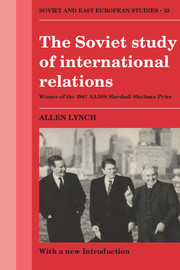Book contents
- Frontmatter
- Contents
- Foreword by Curt Gasteyger
- Acknowledgements
- INTRODUCTION: THE “ NEW POLITICAL THINKING” AND SOVIET FOREIGN POLICY: INTELLECTUAL ORIGINS AND POLITICAL CONSEQUENCES
- INTRODUCTION TO THE FIRST EDITION
- 1 THE BACKGROUND: MARX, LENIN, STALIN AND THE THEORY OF INTERNATIONAL RELATIONS
- 2 THE DEVELOPMENT OF SOVIET POLITICAL STUDIES
- 3 APPROACHES TO INTERNATIONAL RELATIONS
- 4 THE SYSTEMS APPROACH AND INTERNATIONAL RELATIONS
- 5 THE STRUCTURE OF THE INTERNATIONAL SYSTEM: THE SYSTEMS LEVEL
- 6 CRITICAL SUBSYSTEMS
- 7 THE SCIENTIFIC–TECHNICAL REVOLUTION AND THE CHANGING FACE OF INTERNATIONAL RELATIONS
- CONCLUSION
- Notes
- Bibliography
- Index
- SOVIET AND EAST EUROPEAN STUDIES
4 - THE SYSTEMS APPROACH AND INTERNATIONAL RELATIONS
Published online by Cambridge University Press: 05 August 2011
- Frontmatter
- Contents
- Foreword by Curt Gasteyger
- Acknowledgements
- INTRODUCTION: THE “ NEW POLITICAL THINKING” AND SOVIET FOREIGN POLICY: INTELLECTUAL ORIGINS AND POLITICAL CONSEQUENCES
- INTRODUCTION TO THE FIRST EDITION
- 1 THE BACKGROUND: MARX, LENIN, STALIN AND THE THEORY OF INTERNATIONAL RELATIONS
- 2 THE DEVELOPMENT OF SOVIET POLITICAL STUDIES
- 3 APPROACHES TO INTERNATIONAL RELATIONS
- 4 THE SYSTEMS APPROACH AND INTERNATIONAL RELATIONS
- 5 THE STRUCTURE OF THE INTERNATIONAL SYSTEM: THE SYSTEMS LEVEL
- 6 CRITICAL SUBSYSTEMS
- 7 THE SCIENTIFIC–TECHNICAL REVOLUTION AND THE CHANGING FACE OF INTERNATIONAL RELATIONS
- CONCLUSION
- Notes
- Bibliography
- Index
- SOVIET AND EAST EUROPEAN STUDIES
Summary
Each state lives in a system of states, and all find themselves in a system of a certain political balance with respect to each other.
LeninIn the previous chapter, mention was made of Soviet interest in the application of a “systems” approach to the study of international relations. In this chapter Soviet attitudes toward systems approaches will be examined in detail, along with their consequences for the study of international relations. Discussion of more specific, structural aspects of contemporary international relations, that is, of the contemporary international “system,” is reserved for the chapters to follow.
It should be made clear at the outset that the present discussion concerns systems “approaches,” or “perspectives,” as Oran Young put it, rather than systems theory or systems analysis.1 Such a focus, which corresponds to the intermediate, or “middle-range” analysis advocated by some Soviet authors, eschews the concept of system as the basis for a general theory of international relations (in any event, “general” theory is subsumed under dialectical materialism) and accepts it as simply a tool of analysis. Thus understood, “the concept of the system opens the way to better, more comprehensive explanation of international behavior.” Proceeding from Young's definition of system “as a group of actors standing in characteristic relationships to each other (structure), interacting on the basis of recognizable patterns (processes), and subject to various contextual limitations,” how do Soviet specialists in international relations view the prospects of applying a systems approach to their field?
- Type
- Chapter
- Information
- The Soviet Study of International Relations , pp. 71 - 88Publisher: Cambridge University PressPrint publication year: 1987

